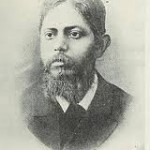Ananda Mohan Bose

One of the most illustrious sons of India, Ananda Mohan Bose was born in Jaisiddhi, a remote village in the Mymansingh district of undivided Bengal (now in Bangladesh) on 23 September 1847 to Padmalochan Bose and Umakishori Devi. Educated at Hardinge School and then in Maymansingh Zilla School, Ananda Mohan stood ninth in the matriculation examination when he was only 15. He went on to study at Presidency College and stood first both in the BA and MA examinations and was also awarded the prestigious Premchand Roychand scholarship, instituted by the Parsi businessman at the University of Calcutta.
He, along with his wife, Swarnaprabha Bose (who was also the sister of Jagadish Chandra Bose), converted to Brahmoism in 1869.
Ananda Mohan sailed to England in 1870 with Keshab Chandra Sen and completed higher studies at Christ Church College, Cambridge. He took mathematics as his principal subject and Greek and Latin as subsidiary subjects. He also earned the distinction of being the first Indian wrangler. Simultaneously, he studied law and was called to the bar in 1874.
Ananda Mohan met Surendranath Banerjea in England in 1871. On his return to India, Ananda Mohan started his career as a lawyer in the Calcutta High Court and won distinction in his career. He also took active interest in the social and political life of Bengal with much zeal and enthusiasm. When Surendranath was unfairly dismissed from the Indian Civil Service in 1874, Ananda Mohan tried to help him. With Surendranath as his mentor and through his own organisational ability, Ananda Mohan set up a number of pioneering institutions. The Calcutta Students Association set up in 1875 was the earliest attempt made to organise students for constructive political work. The Indian Association started in 1876 was the first political organisation at an all-India level to institute a vigorous agitation for rights and privileges of the Indian citizens. They campaigned to raise the minimum age for Indian candidates in the Indian Civil Service. He organised a National Conference in 1883 under the aegis of the Indian Association. When the Indian National Congress was founded in 1885, Bose became a member. and was also elected the President of the Indian National Congress in its 1898 session held in Madras.
After breaking away from the second phase of the Brahmo movement led by Keshab Chandra Sen, Ananda Mohan, along with Shibnath Shastri, Shib Chandra Deb, Umesh Chandra Dutta, Bijoykrishna Goswami, Dwarkanath Bandyopadhyay and others, started the third phase of the Brahmo movement and was elected the first President of the newly formed Sadharan Bramho Samaj established on 15 May 1878. The City School and the City College were established by him.
Ananda Mohan was called ‘Saint Bose’ by his friends and admirers for his truthfulness and nobility of character. Sister Nivedita called him ‘a forerunner of a new Knighthood of Civil Order’. He was known for his personal integrity and public commitment, true to the spirits of the great Bengal Renaissance.
Ananda Mohan returned to England in 1897 to enrol his two sons into university. He undertook a tour of England delivering speeches about the Brahmo Samaj.
He addressed a large gathering on 16 October 1905 protesting against the partition of Bengal.
Ananda Mohan Bose passed away on 20 August 1906.